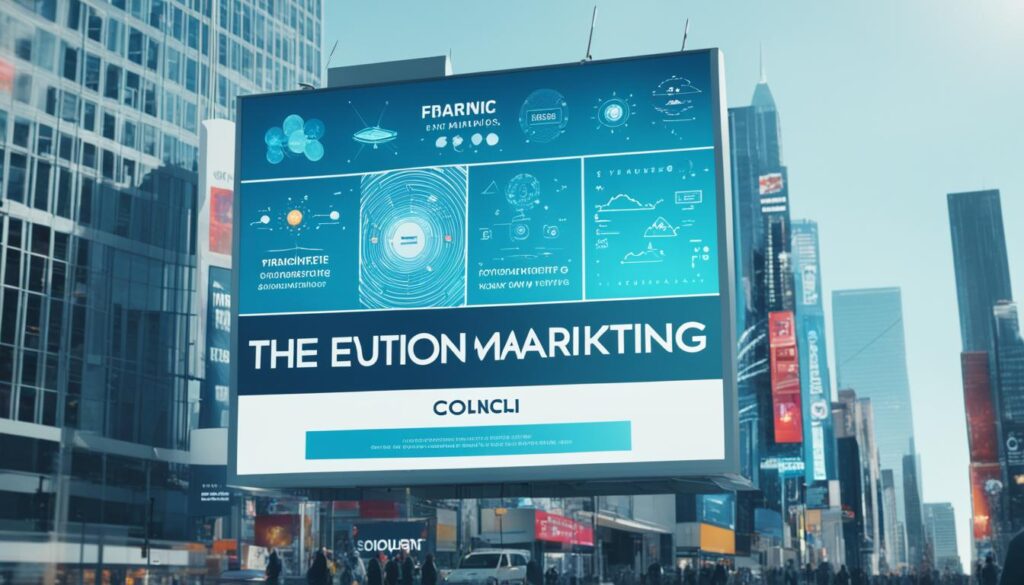“The best marketing doesn’t feel like marketing.” – Tom Fishburne
Companies are always trying to connect with people in meaningful ways. Now, artificial intelligence (AI) is changing the game. It helps create smarter marketing plans. AI uses data to make marketing more personal and efficient. It turns ideas into reality, making marketing better and more targeted.
Marketing and AI are changing fast. Now, AI helps marketers do things they never thought possible. Take Tarvent, for example. It offers tools that make marketing more efficient and successful. AI can predict what customers will do next and make their experiences better. This leads to more sales and fewer customers leaving.
Key Takeaways
- AI-driven predictive analytics enhance customer targeting and personalization.
- Automation of repetitive tasks with AI allows teams to focus on strategic activities.
- Intelligent AI content recommendations lead to higher customer engagement.
- AI-powered platforms like Tarvent improve marketing efficiency and ROI.
- AI enables preemptive actions to reduce customer churn.
- Businesses are rapidly adopting AI for more efficient marketing efforts.
Introduction to AI in Marketing
Artificial intelligence in marketing is changing the game for businesses. It brings precision, scale, and adaptability. These qualities help companies boost their standing in today’s digital world. The introduction of AI in marketing lets businesses use tech to be more efficient and improve customer experiences.
Marketing with AI is evolving. There are new uses for it, like understanding audiences and boosting conversions. AI tools can choose the best ways to talk to customers all on their own. They send personalized messages without needing a human. This makes sure customers get constant, tailored attention.
| Role of AI in Marketing | Impact |
|---|---|
| Data Analysis | AI examines lots of data from marketing campaigns to offer valuable insights. |
| Natural Language Processing (NLP) | It makes content, helps customer service bots, and personalizes experiences sound more human. |
| Media Buying | AI predicts where ads should go to meet the right people and improve ROI. |
| Automated Decision Making | Based on past data or new information, AI shapes marketing strategies. |
| Content Generation | With AI, creating video titles, email subjects, and web content gets easier. |
| Real-time Personalization | It customizes experiences on the spot, based on past likes to prompt actions. |
AI-driven technologies make digital marketing more accurate. They analyze new and old information to guide marketing moves. Plus, AI platforms bring all data together. They give insights that help businesses connect with their audience in the best way.
But the rise of AI in marketing faces hurdles. These include the time to train AI, keeping data quality high, ensuring privacy, and keeping up with market changes. Companies embracing AI in marketing see it as a partner. It helps them sharpen their strategies.
The Evolution of Artificial Intelligence in Marketing
The journey of AI in marketing started as just ideas in science fiction. Now, it’s a key part of modern marketing. This change happened thanks to big strides in machine learning and computers.
The Early Days of AI: From Science Fiction to Reality
In the 1950s and 1960s, experts started using AI for marketing strategies. They used linear programming, game theory, and decision trees. These methods helped improve marketing mix and pricing.
The 1970s and 1980s brought expert systems and neural networks. Marketers began modeling and predicting customer behavior. This moved marketing closer to focusing on customers’ needs and wants.
Recent Advances in Machine Learning and AI Technologies
The internet boom in the 1990s and 2000s changed everything. Marketers used AI for web analytics, SEO, and email marketing. This helped companies engage with customers online.

From the 2010s, big data and cloud computing led to even more AI use in marketing. Natural language processing and deep learning improved how we understand customer behavior. This helped personalize marketing on a new level.
Today, big names like Netflix use AI to make better recommendations and even decide on new shows. In 2019, 84 percent of marketing pros were using AI in their work. This shows how important machine learning has become in marketing.
| Decade | AI Techniques | Marketing Applications |
|---|---|---|
| 1950s-1960s | Linear Programming, Game Theory, Decision Trees | Marketing Mix, Pricing Strategies |
| 1970s-1980s | Expert Systems, Neural Networks | Customer Behavior Modeling, Personalized Recommendations |
| 1990s-2000s | Web Analytics, SEO, Email Marketing | Online Customer Engagement |
| 2010s-2020s | Big Data, Cloud Computing, NLP, Computer Vision, Deep Learning | Data Analysis, Behavioral Predictions, Personalization |
Benefits of AI in Modern Marketing
Using artificial intelligence in marketing provides many benefits. Organizations use AI to stay ahead in a competitive market. It helps by offering insights based on data, improving how we talk to customers personally, and making ad spending more efficient. These changes are big for the world of marketing.
Enhanced Data-driven Insights
AI’s big win is giving better data-driven marketing insights. A Persado survey found that marketers pick the best digital messages only 30% of the time. AI closes this gap. It does so by analyzing lots of data to pick the best messages and concepts accurately. For example, analyzing data from a retail client over three years revealed successful patterns. This analysis included over 2 million messages and close to 100 million customer interactions.
Improved Customer Personalization
Customers expect personalized experiences, with 71% of them wanting brands to customize their interactions. AI makes this easier. It lets marketers create tailored experiences for everyone, everywhere. About 88% of marketers say AI has really helped them do this. Tools like MarketingCloudFX, fueled by IBM Watson AI, have even increased profits by 20%.

Efficiency in Ad Spend and Targeting
AI is changing how we spend on and target ads. Digital marketing spending increased by 17% last year, reaching over $389 billion. This shows how important it is to target ads smartly. AI-driven ad targeting lets brands spend their budget more effectively by focusing on the right audiences. This reduces waste and increases the effectiveness of ads. AI’s fast data analysis and predictive analytics also help forecast trends. This means marketers can make better and more impactful decisions.
| Benefit | AI Impact | Statistic |
|---|---|---|
| Data-driven Insights | Precise identification of effective messages | 30% of experienced marketers correctly chose top messages |
| Customer Personalization | Enhanced personalization across channels | 71% of consumers expect personalized experiences |
| Ad Spend Efficiency | Optimized targeting and reduced wastage | Global spend increased by 17% to $389 billion |
Key AI Tools for Marketing Professionals
As we dive into 2024, the marketing world is more data-focused than ever. It leans on information about competitors, market trends, and what customers say. AI tools have made collecting and using this data easier, improving speed and scale. Marketing automation and smart strategies let marketers get great results.
Jasper AI is a leading AI-powered tool for writing. It’s used by over 350,000 people. Jasper AI can write in many tones and styles after examining about 10% of the internet. It offers thousands of templates and supports 25 languages. This makes it a key tool for creative marketing.

Surfer SEO helps improve content for better search engine spots. It compares your content with the best out there. Big names like FedEx and Shopify use it. It’s crucial for automating marketing and making content better.
For eye-catching campaigns, Lexica Art is amazing. This AI generates lifelike images. It combines AI smarts and creativity for stunning visual marketing.
Notion AI fits into the Notion app to help with tasks. It costs $8 to $10 per person each month. This boosts team work and makes processes smooth.
Sprout Social shows the power of AI in handling social media data. It processes over 600 million messages a day. This tool is vital for understanding customer feelings and making smarter marketing moves.
Writer.com makes team work better with its writing assistance. It offers autocorrect, autocomplete, and checks for good grammar. This helps create clear, well-written marketing content.
These AI tools are changing the marketing game. They help with analyzing, creating content, and automating tasks. Marketing pros can now engage better and work more efficiently with their campaigns.
How Machine Learning is Shaping Marketing Efforts
Machine learning (ML) is changing the game in marketing today. It lets companies change how they connect with people. Predictive analytics and targeting specific groups are making marketing better.
Predictive Analytics for Campaign Success
Marketing now uses ML to look at big data and find trends people might miss. This lets businesses guess customer behavior. Then, they can change their campaigns based on data.
Predictive analytics helps predict market trends and manage ad money. This means campaigns do better. AI also makes customer messages more personal. This makes people more loyal.
Audience Segmentation for Targeted Marketing
Machine learning uses lots of data to find customers likely to buy. This helps make marketing plans that speak to certain groups. By knowing who to target, companies can make their content more fitting.
This improves chances of selling and makes customers happier. ML also makes the marketing process automatic. It moves leads forward based on how they act. This makes marketing work better overall.
| Key Benefit | Description | Impact |
|---|---|---|
| Predictive Analytics | Using data to foresee customer behaviors and market trends | Higher campaign success and optimized ad spend |
| Targeted Segmentation | Identifying customer segments with high purchase intent | Enhanced relevance and higher conversion rates |
| Marketing Funnel Automation | Advancing leads based on their interactions | Improved efficiency and personalized customer experiences |
By using machine learning in marketing, companies grow and change the customer journey. This builds long-term loyalty and engagement.
Implementing AI-driven Marketing Automation
In today’s fast world, using AI for marketing automation is a must to stay ahead. Businesses that use AI tools see better operations, improved customer talks, and spot-on marketing. It’s vital to have a solid plan to make the most of these innovations for good results.
Streamlining Email Campaigns
Using AI in email campaigns has changed the way marketers talk to people. AI looks at user actions to create messages that really speak to each person. This leads to more people engaging.
AI also makes these campaigns better by tweaking them on the fly, like changing designs, who to target, and when to send things out. Forbes says 42% of companies are now using AI to create content. This shows it’s really catching on.
Automated Customer Interactions with Chatbots
Chatbots are key in automating talks with customers, giving quick help and tailored support. They can do lots of tasks, from answering simple questions to helping with complex steps. Happy customers and built-up relations come from always being there and on time.
Adding AI chatbots not just boosts efficiency but also lets marketers work on bigger strategies.
Marketing and AI: A Symbiotic Relationship
The partnership between AI and marketing is getting stronger and more productive. Over 8 years, we’ve seen AI hugely improve sales by making marketing sharper and more insightful. AI algorithms play a key role. They help understand what customers like and want. This makes it possible to give customers very personal experiences.
AI’s predictive analytics have really changed the game for marketing strategies, boosting returns on investment. AI-driven chatbots have taken customer service to the next level, making interactions smooth and fast. Also, AI has made programmatic advertising much smarter, making sure marketing hits the mark every time.
AI is also making big waves in SEO, keeping marketers one step ahead in a fast-changing world. This growing partnership keeps making the marketing field more exciting. It’s all about using data wisely and being ready to change quickly to grow.
Adding AI into the marketing mix helps meet immediate goals and also sets up for future success. It gives deeper insights into what consumers want and how to approach market trends flexibly. This teamwork between AI and marketing is creating new chances to win in the tough digital world.
symbiotic relationship between digital marketing and AI
‘ল
Case Studies: Successful Use of AI in Advertising
Today, brands are using AI for better ads and big returns. The global AI marketing value could hit $108 billion by 2028. This shows the growing trust in AI tech. Here, we spotlight some successful AI marketing case studies showing AI in advertising‘s power.
Brands Leveraging AI for Enhanced Campaigns
Heinz’s AI campaign got over 850 million impressions and brought in 2500% more than spent. This shows AI can make campaigns reach further.
Nike celebrated Serena Williams with an AI campaign. It attracted 1.7 million YouTube viewers. This shows AI’s power to engage audiences.
Cosabella, an Italian lingerie brand, used AI to overhaul its email marketing. This led to a 60% revenue boost from emails. Their “12 Days of Cosabella” campaign saw sales jump by 40-60%.
Real-world Examples of AI Delivering ROI
Tomorrow Sleep’s AI content strategy increased visitors from 4K to 400K a month. AI played a key role in boosting their site’s performance.
Euroflorist saw better conversion rates with AI-driven tests on their website. This example shows how AI helps make smarter, data-based decisions to improve shopping experiences and sales.
JP Morgan Chase used the AI tool Persado for its ad copy, which quadrupled click-through rates. This proves AI-driven ROI and highlights AI’s effectiveness in advertising.
These successful AI marketing case studies prove AI in advertising can greatly improve campaign results. It makes campaigns more engaging and boosts investment returns, showing AI’s critical role in modern marketing.
Challenges and Considerations in AI Marketing Adoption
The adoption of AI in marketing has been slower than expected. The main reason for this delay is the lack of skilled professionals. These experts can help push AI projects forward. Not having enough of them really slows things down. Also, some businesses don’t see all the benefits of AI. Or they’re too careful because they don’t understand it well. This makes them slow to adopt AI.
Many companies struggle with data problems when they try to use AI. If the data is incomplete or wrong, marketing plans can fail. This shows how important good data is. AI can also be complex, which makes it hard for companies. They need easier ways to start using AI. This would help them switch to AI more smoothly.
Fears about privacy and data safety are big concerns in AI for marketing. Companies must work hard to make customers trust them. Also, marketers worry that using AI too much might limit creativity. A study found that 64% are worried about this. Still, 88% see the value in AI. But 67% say not to rely on it too much. This shows we need to find a balance. Using AI the right way can help businesses grow stronger and last longer.



